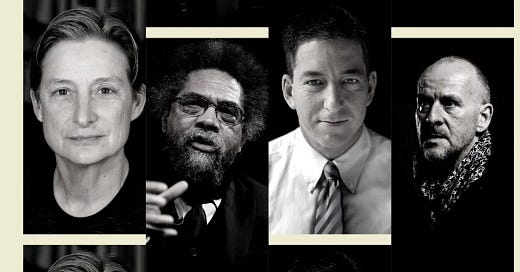What Do We Mean By ”Identity Politics”?
Judith Butler, Glenn Greenwald, Cornell West, and Simon Critchley in the Holberg Debate, and more

July 21, 2022
In this week’s issue of Public Seminar: culture wars, lessons from the Weimar Republic, understanding the algorithm, and more.
The Holberg Debate
“Very often, I feel that social movements on the Left are grouped as identity politics, even though they do not always argue on the basis of identity. In other words, it’s not just a question of claiming, this is my identity, and I deserve social and public recognition for this identity. That may be in the mix, but usually it will take the form ‘I am living in a world in which justice, a democratic ideal of a hallowed political principle, has not yet become justice for all.’ So, if I talk about racial justice, am I talking about identity, or am I saying that whatever forms of justice we’re living with have not yet benefited from the emancipatory movements that seek to establish racial justice as part of justice?” Judith Butler joins Glenn Greenwald, Cornel West, and moderator Simon Critchley in the Holberg Debate. (July 18, 2022)
Political Theater
In bringing insurrectionists to justice, we should observe the lessons of the Weimar Republic, writes Claudia Koonz: “Hitler […] transformed a crushing defeat into victory because sympathetic Bavarian judges allowed him to take center stage with a big lie. While his co-defendants pleaded not guilty, Hitler proudly took responsibility for the treasonous debacle. For 24 days in court he raged, often for hours at a time, against the ‘Jewish-Marxist criminals’ whose surrender to Allied armies in 1918 had been the ‘greatest disgrace in German history.’” (July 19, 2022)
Self-Critical Theory
“One-Dimensional Man suggested that a life in search of world-changing wisdom was mine for the taking—if only I would suspend the skepticism drummed into me by mindless Anglo-American empiricism.” In an excerpt from Books That Matter II, the new issue of Social Research, James Miller describes the mind-altering experience of reading Herbert Marcuse. (July 20, 2022)
New to our newsletter? Subscribe to receive free updates from our digital public commons.
The Algorithm
In a conversation with Lydia Nobbs, author Justin Joque explains how the statistical methods that underpin algorithms became the organizational backbone for contemporary capitalism to extract value. “An example is YouTube as an engine for radicalization. You click on something and next it starts recommending neo-Nazi propaganda, white supremacist, or anti-trans videos. It’s not because the engineers wanted that, but they’re trying to optimize for profit. The algorithm figures out that it can draw people into watching something more extreme, and the profit motive for YouTube and reactionary content are now in a feedback loop. One is profiting off the other, then re-entrenching it.” (July 20, 2022)
Fast Fashion
“There are compounded layers of oppression that have produced big closets. But also, and this is a little bit of a leap, big closets reflect a nation starved for meaning. What does it take to need that much stuff?” Fashion historian Sofi Thanhauser chats with AJ Morris about textile waste and what comes next in holding the garment industry accountable. (July 20, 2022)



